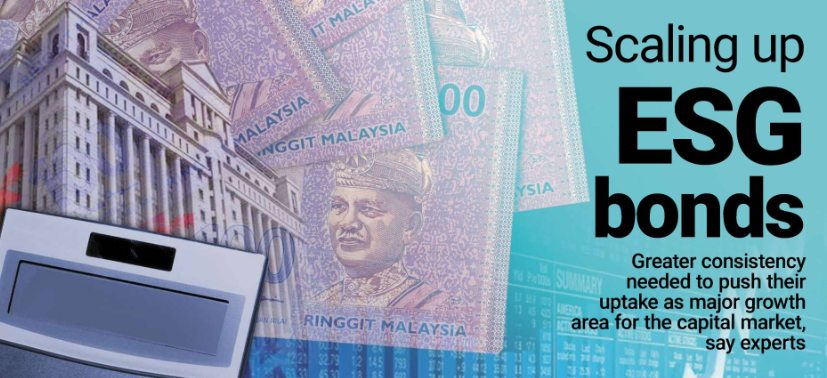
BIX ARTICLE
Scaling up ESG bonds
Nov 28, 2023
|
6 min read
Featured Posts
Social Bonds Illustrative Use-Of-Proceeds Case Studies Coronavirus
Jul 06, 2020
|
2 min read
Sustainable Banking Network (SBN) Creating Green Bond Markets
Jul 06, 2020
|
2 min read
Why is Inflation Making a Big Comeback After Being Absent for Decades in the U.S.?
Mar 24, 2022
|
7 min read
SC issues Corporate Governance Strategic Priorities 2021-2023
Mar 29, 2022
|
3 min read

PETALING JAYA: Lack of consistency in the classification of environmental, social and governance (ESG) has been a major challenge in the development of the ESG market in the country.
“One of the greatest challenges has always been (a lack of) consistency. There is no one standard classification for ESG,” Hong Leong Investment Bank Bhd head of treasury and markets Chong Poh Choon said during a virtual panel discussion at “MARC Malaysian Bond & Sukuk Conference 2023: Sustainable Transition to a Greener Economy” yesterday.
He added that the Securities Commission (SC) and Bank Negara have been pushing for a more standardised ESG classification some four years ago.
“Most of us here are familiar with ESG classifications. We have now reached a stage where banks, the market players together with the regulators are assessing the industry data that they collected over the past few years and trying to fine tune the methodology to come up with the best classification,” Chong said.
In 2022, the SC’s sustainable and responsible investment (SRI)-linked Sukuk Framework, which is aligned with international standards and best practices, was released.
The SC has also incorporated the Asean Sustainability-Linked Bond Standards into its regulatory framework, giving the Malaysian capital market a complete suite of bond and sukuk standards to help companies raise financing for transition purposes.
“One of the positive developments I see is that two years ago, the focus was very much on the ‘E’, but increasingly now we are looking at sustainability and governance.
“We are looking at ESG more holistically compared to three to four years ago, where it has been about carbon emissions,” Chong said.
He added that the ESG bond market will be a major growth area in the Malaysian capital market over the next two to three years as this relatively nascent segment turns mainstream.
Chong said the Malaysian ESG bond market will be akin to the Islamic bond market, which has now become the world’s biggest Islamic bond market.
“When it (the Islamic bond market) came out, everyone was looking at it. Then naturally, when time went by, it became a mainstream part of the market. We are probably experiencing this with ESG bonds now.
“From the asset-management side, there is certain demand. For certain institutions, they are even very strict in terms of targeted portfolio size that they have to maintain for a specific fund on the ESG aspect. That itself will drive the demand,” Chong added.
He said in terms of the supply, it would make sense for issuers to go into the ESG space, although it may or may not be cheaper than conventional bonds in terms of pricing.
“At the moment, I can’t say that convincingly (whether it is cheaper), but if it is an ESG bond, you are definitely garnering more interest from a wider variety of investors. It will definitely be a growth area for the capital market in the next two to three years. This is a major growth area for many years to come,” he added.
Chong added that the growth of ESG bond issuance can be accelerated not only via new financing but refinancing of existing bonds as well.
“Over the past one to two years, banks have invested in resources. Going forward, if we talk about ESG, it comes from two areas, One is the new financing for solar and hydro plants.
“On the other hand, we are actively looking to help existing customers to convert their loans or bonds to ESG bonds or refinance it to ESG by putting in certain measures. This will be a good thing for the market.
“From the issuer perspective, they are able to refinance using the ESG bond and for the market overall, there will be more selection of ESG bonds.
“If we just depend on new financing, that will be a definite amount. So, if we add on potential refinancing, then we will potentially see a larger issuance, and hopefully, that will pan out starting in 2024 or 2025. Then, all of us will have more selection of bonds to go for, going forward,” he added.
Meanwhile, Malaysia remains the regional leader in SRI sukuk with the cumulative issuances of SRI sukuk having reached around RM27bil, since the launch of the SRI Sukuk Framework in 2014.
“This year alone, up to October, three SRI sukuk with a total programme size of RM2.2bil have been lodged with the SC,” SC chairman Datuk Seri Awang Adek Hussin said in a keynote address at the conference.
“We lead SRI sukuk regionally. Malaysia issued the first sovereign US dollar sustainability sukuk in 2021 with a 6.4 times bid-to-cover ratio. This was despite significant spikes in interest rates globally, and the gradual reopening of the economy,” he added.
However, Awang Adek has called for market players to take more concrete actions to address climate change and promote sustainability in Malaysia.
To reach net-zero emissions by 2050, annual clean energy investment worldwide will need around US$4 trillion by 2030. Malaysia alone needs RM1.3 trillion by 2050.
“Considering the huge financing requirement, the financial sector, particularly the capital market, must continue to facilitate financing and investments in these key areas to support the government’s priorities.
“With a total outstanding value of RM2 trillion as of Oct 31, 2023, it represents more than 50% of the Malaysian capital market. Malaysia is indeed the largest sukuk market with 35% of global outstanding sukuk, ahead of Saudi Arabia and Indonesia” he added.
Disclaimer
The information provided in this report is of a general nature and has been prepared for information purposes only. It is not intended to constitute research or as advice for any investor. The information in this report is not and should not be construed or considered as an offer, recommendation or solicitation for investments. Investors are advised to make their own independent evaluation of the information contained in this report, consider their own individual investment objectives, financial situation and particular needs and should seek appropriate personalised financial advice from a qualified professional to suit individual circumstances and risk profile.
The information contained in this report is prepared from data believed to be correct and reliable at the time of issuance of this report. While every effort is made to ensure the information is up-to-date and correct, Bond and Sukuk Information Platform Sdn Bhd (“the Company”) does not make any guarantee, representation or warranty, express or implied, as to the adequacy, accuracy, completeness, reliability or fairness of any such information contained in this report and accordingly, neither the Company nor any of its affiliates nor its related persons shall not be liable in any manner whatsoever for any consequences (including but not limited to any direct, indirect or consequential losses, loss of profits and damages) of any reliance thereon or usage thereof.
YOU MAY ALSO LIKE
ARTICLE
Feb 23, 2026
|
5 min read
ARTICLE
Feb 16, 2026
|
5 min read
ARTICLE
Feb 06, 2026
|
5 min read
ARTICLE
Feb 05, 2026
|
4 min read


